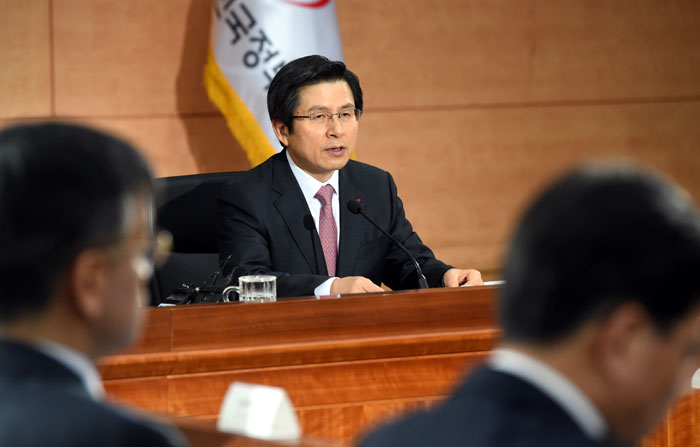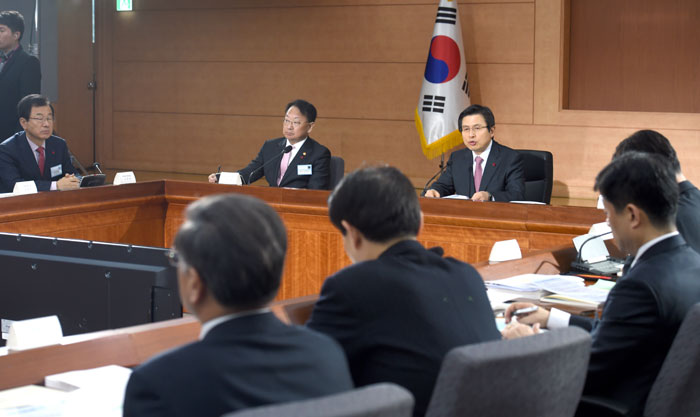-
 Korea.net's 24-hour YouTube channel
Korea.net's 24-hour YouTube channel- NEWS FOCUS
- ABOUT KOREA
- EVENTS
- RESOURCES
- GOVERNMENT
- ABOUT US
This year, more than 60,000 jobs will be created in the public sector.
In addition to this, a total of KRW 17 trillion will be injected into 12 selected new industries.
Various measures will be introduced to enhance the convenience and safety of public transport, such as more non-stop KTX trains, and to help achieve exports worth over KRW 510 billion.
These are part of a policy briefing given by five government ministries on the theme of “a strong economy,” at the Government Complex-Seoul on Jan. 5. The five participating government organizations were the Ministry of Strategy and Finance, the Ministry of Trade, Industry and Energy, the Ministry of Land, Infrastructure and Transport, the Financial Services Commission and the Fair Trade Commission.

To boost employment, the Ministry of Strategy and Finance will execute its budget of KRW 17.1 trillion in a swift manner and recruit 20,000 new full-time employees at public organizations. Among the planned recruits, 55 percent of them -- some 11,100 jobs -- will be employed within the first half of 2017.
Deputy Prime Minister and Minister of Strategy and Finance Yoo Il-ho said in the briefing that, “Quality jobs in the public sector will be open in the first half of the year in order to contribute to solving youth unemployment.”

During the briefing session, measures were announced to improve the convenience and safety of public transport. The Ministry of Land, Infrastructure and Transport will begin operating non-stop, premium KTX trains on the Seoul-Busan route from this June. The new non-stop high-speed train will travel between Seoul and Busan within 1 hour and 50 minutes, more than 30 minutes faster than existing trains. The ministry is considering both the KTX and the Super Raid Train (SRT), which travels between Suseo and Busan and Mokpo.
The ministry plans to operate autonomous shuttle buses that can carry up to 12 passengers in Pangyo and other downtown areas in the second half of 2017, and in Pyeongchang during the PyeongChang 2018 Olympic and Paralympic Winter Games. It will continue to develop new engines of economic growth based on state-of-the-art technology, such as "smart construction," the use of big data in the transport sector and "smart" railway systems.
The Ministry of Trade, Industry and Energy announced policies that concentrated on exports and measures designed to respond to the fourth industrial revolution. The trade ministry will introduce various measures to boost exports and to achieve its export goal of selling KRW 510 billion overseas this year. To this aim, it will concentrate on supporting 80 selected firms that produce consumer goods and which have regular sales worth more than USD 0.1 billion a year, in order to help turn them into leading brands.
The ministry will also focus on developing 12 selected new industries. The 12 new industries are: the Internet-of-Things-based home appliances; electric autonomous vehicles; robots; drones; biotechnology and healthcare; premium consumer gods; high-tech new materials; virtual reality (VR); augmented reality (AR); next-generation semiconductors; next-generation displays; and energy. Both the government and the private sector will inject KRW 17 trillion to ease regulations, establish platforms for conversion among sectors, and to create and strengthen the market in the early stages.
The ministry will expand investment to KRW 3.7 trillion in the research and development of new industries, up KRW 0.4 trillion from that of last year. It will also build 5,000 more "smart factories," of which currently there are 2,800. Among them, 500 plants will be built as clean energy smart plants that are equipped with Energy Storage Systems and Energy Management Systems.
The Financial Services Commission will test operate the so-called “bio-pay system” within the first half of this year. The system is based on biological information, such as the veins on the palms of your hands and the iris. If the system is introduced, users can purchase things by touching their palms or having their iris scanned, without having to pay by cash or card.
Acting President Hwang Kyo-ahn urged the ministries in the briefing session to “put priority on job creation and actively support companies through tax support so that they can make more jobs.”
He also emphasized the importance of deregulation, saying that, “Improving the investment environment based on deregulation can be a shortcut to creating more jobs. I hope the government ministries can make bold moves to advance regulations by reviewing all existing regulations in general.”
By Yoon Sojung
Korea.net Staff Writer
Photos: Prime Minister’s Office
arete@korea.kr
In addition to this, a total of KRW 17 trillion will be injected into 12 selected new industries.
Various measures will be introduced to enhance the convenience and safety of public transport, such as more non-stop KTX trains, and to help achieve exports worth over KRW 510 billion.
These are part of a policy briefing given by five government ministries on the theme of “a strong economy,” at the Government Complex-Seoul on Jan. 5. The five participating government organizations were the Ministry of Strategy and Finance, the Ministry of Trade, Industry and Energy, the Ministry of Land, Infrastructure and Transport, the Financial Services Commission and the Fair Trade Commission.

Acting President Hwang Kyo-ahn emphasizes the importance of creating jobs during a policy briefing at the Government Complex-Seoul on Jan. 5.
To boost employment, the Ministry of Strategy and Finance will execute its budget of KRW 17.1 trillion in a swift manner and recruit 20,000 new full-time employees at public organizations. Among the planned recruits, 55 percent of them -- some 11,100 jobs -- will be employed within the first half of 2017.
Deputy Prime Minister and Minister of Strategy and Finance Yoo Il-ho said in the briefing that, “Quality jobs in the public sector will be open in the first half of the year in order to contribute to solving youth unemployment.”

Five government ministries announced various measures to create more jobs and to stabilize people's livelihoods during a policy briefing session that focused on creating a stronger economy.
During the briefing session, measures were announced to improve the convenience and safety of public transport. The Ministry of Land, Infrastructure and Transport will begin operating non-stop, premium KTX trains on the Seoul-Busan route from this June. The new non-stop high-speed train will travel between Seoul and Busan within 1 hour and 50 minutes, more than 30 minutes faster than existing trains. The ministry is considering both the KTX and the Super Raid Train (SRT), which travels between Suseo and Busan and Mokpo.
The ministry plans to operate autonomous shuttle buses that can carry up to 12 passengers in Pangyo and other downtown areas in the second half of 2017, and in Pyeongchang during the PyeongChang 2018 Olympic and Paralympic Winter Games. It will continue to develop new engines of economic growth based on state-of-the-art technology, such as "smart construction," the use of big data in the transport sector and "smart" railway systems.
The Ministry of Trade, Industry and Energy announced policies that concentrated on exports and measures designed to respond to the fourth industrial revolution. The trade ministry will introduce various measures to boost exports and to achieve its export goal of selling KRW 510 billion overseas this year. To this aim, it will concentrate on supporting 80 selected firms that produce consumer goods and which have regular sales worth more than USD 0.1 billion a year, in order to help turn them into leading brands.
The ministry will also focus on developing 12 selected new industries. The 12 new industries are: the Internet-of-Things-based home appliances; electric autonomous vehicles; robots; drones; biotechnology and healthcare; premium consumer gods; high-tech new materials; virtual reality (VR); augmented reality (AR); next-generation semiconductors; next-generation displays; and energy. Both the government and the private sector will inject KRW 17 trillion to ease regulations, establish platforms for conversion among sectors, and to create and strengthen the market in the early stages.
The ministry will expand investment to KRW 3.7 trillion in the research and development of new industries, up KRW 0.4 trillion from that of last year. It will also build 5,000 more "smart factories," of which currently there are 2,800. Among them, 500 plants will be built as clean energy smart plants that are equipped with Energy Storage Systems and Energy Management Systems.
The Financial Services Commission will test operate the so-called “bio-pay system” within the first half of this year. The system is based on biological information, such as the veins on the palms of your hands and the iris. If the system is introduced, users can purchase things by touching their palms or having their iris scanned, without having to pay by cash or card.
Acting President Hwang Kyo-ahn urged the ministries in the briefing session to “put priority on job creation and actively support companies through tax support so that they can make more jobs.”
He also emphasized the importance of deregulation, saying that, “Improving the investment environment based on deregulation can be a shortcut to creating more jobs. I hope the government ministries can make bold moves to advance regulations by reviewing all existing regulations in general.”
By Yoon Sojung
Korea.net Staff Writer
Photos: Prime Minister’s Office
arete@korea.kr
Most popular
- China warmly welcomes first Korea-born giant panda Fu Bao
- First hearing-impaired K-pop act hopes for 'barrier-free world'
- Novelist Hwang's 'Mater 2-10' shortlisted for Int'l Booker Prize
- Expats could account for 7% of population in 20 years: report
- Nat'l Fire Agency picks 137 elite staff for deployment abroad













